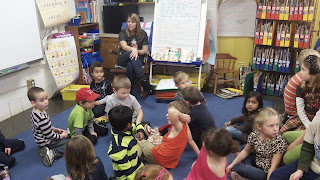*I will try to highlight new dates and information with red text.
December 23, 2013 - January 3, 2014: Winter break - no school. Have a great holiday. There will not be a newsletter next week.
January 6, 2014: First day back to school.
January 16, 2014: End of the second quarter. Please avoid appointments this week as I'll be assessing.
January 17, 2014: No school, teacher grading day.
How to Stay Sharp during Winter Break
What We Learned This Week
Word Study
I've been slowly building our word study workshop. It now includes the following daily activities:
- Memorizing the spelling of commonly missed high frequency words using a multi-sensory approach.
- Introduction of a vocabulary word that we use in sentences and daily writing. Word origin and meaning are emphasized (and often very interesting).
- Daily phonics (e.g., short vowel sounds)
- Word ladders connect words we know with words we want to use.
- Weekly spelling generalization. This week's generalization was consonant blends (fl/dr/br). This also gives us an opportunity for syllabication, classification of words by syllable type (open, closed, VCE, vowel team, etc.), parts of speech, and to look at other generalizations (e.g., doubling the consonant before a suffix).
- Analogies.
- Memorizing the spelling of commonly missed high frequency words using a multi-sensory approach.
- Introduction of a vocabulary word that we use in sentences and daily writing. Word origin and meaning are emphasized (and often very interesting).
- Daily phonics (e.g., short vowel sounds)
- Word ladders connect words we know with words we want to use.
- Weekly spelling generalization. This week's generalization was consonant blends (fl/dr/br). This also gives us an opportunity for syllabication, classification of words by syllable type (open, closed, VCE, vowel team, etc.), parts of speech, and to look at other generalizations (e.g., doubling the consonant before a suffix).
- Analogies.
It is a lot to pack in, but has many direct links to our reading and writing.
Reading Workshop (and Social Studies)
We are working on idioms, predictions and inferences. Students should understand predictions are best guesses about what might happen in the future based on evidence an inferences are conclusions we can draw about things that have already happened or are still occurring base on evidence. We are also studying context clues.
We are working on idioms, predictions and inferences. Students should understand predictions are best guesses about what might happen in the future based on evidence an inferences are conclusions we can draw about things that have already happened or are still occurring base on evidence. We are also studying context clues.
Writing
We are working hard on persuasive essays. Students are given a topic to debate and a time limit to construct their position. Then opposing sides debate. Typically three students are chosen for each position. Scores are awarded for topic sentence, details, and conclusions. Students must write unique details (you don't get multiple points for the same argument presented multiple times). They can earn bonus points for supporting their position with personal experiences, countering the opposition, and using this week's vocabulary. The class is really enjoying these and we're having spirited debates on topics such as how to find more learning time in our day (lengthen the school day, reduce specials, or have a single recess) and whether or not students should be responsible for cleaning Windermere. Our attention to convention has dropped off some, which is one of the reasons I'm emphasizing it in our homework responses so much, but the content and amount of daily writing is wonderful. We will write our pen pals after break. Encourage your student to recall activities they do over the holidays.
Math Workshop
We are deep into our fractions these days. We are learning the following:
- The denominator is our best friend in fractions. It tells us how many equal groups or shares we have in our whole or set.
- The numerator tells us how many groups or shares we are using or considering.
- We used paper folding to explore what happens to fractions when they are doubled (the number of pieces in our set doubles), equivalent fractions, the understanding that fractions depend on the whole (e.g., 2/3 of 6 is 4 but 2/3 of 12 is 8), and the understanding that fractions can have different shapes, but the same value (e.g., a square can show 1/2 by folding it in half along a vertical or diagonal axis).
- Students should be able to determine an equivalent fraction and the whole number of pieces in the whole or set for an array or story problem (e.g., 2/4 of 8 equivalent to 4/8 and represents 4 pieces). They should also be able to identify the fraction of a whole or set the number of pieces represent (e.g., 6 pieces represents 1/2 of 12).
- Students should be able to determine remaining fractions in story problems by drawing a picture (e.g., 1/2 of a garden is planted with lilies, 1/4 is planted with chrysanthemums, 1/8 with lavender and the rest is planted with violets. What fraction of the garden is planted with violets? 1/8).
- We will be adding and subtracting fractions, putting them on a number line, and comparing fractions.
Science
I've introduced force and motion and we will be doing a full morning of physical science on Monday. Key learnings will be:
- Force is a push or pull (gravity, friction, and magnetism are uniquely discussed).
- Motion is a change in direction.
- Energy is the potential to do work.
- Isaac Newton's first law of physics states objects at rest stay at rest (inertia) unless acted on by another force and objects in motion stay in motion (inertia) unless acted on by another force.
We concluded measuring our lizard water toy and are letting it contract to begin a new experiment soon.































































